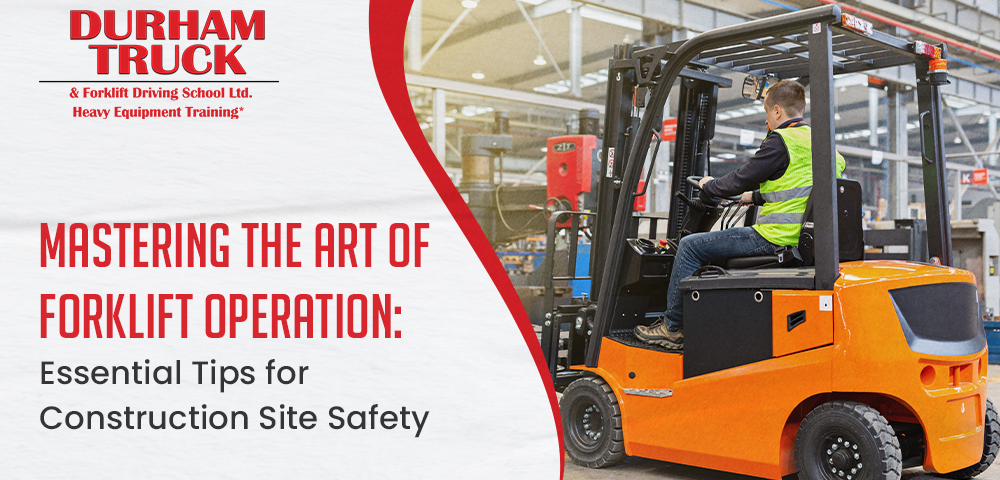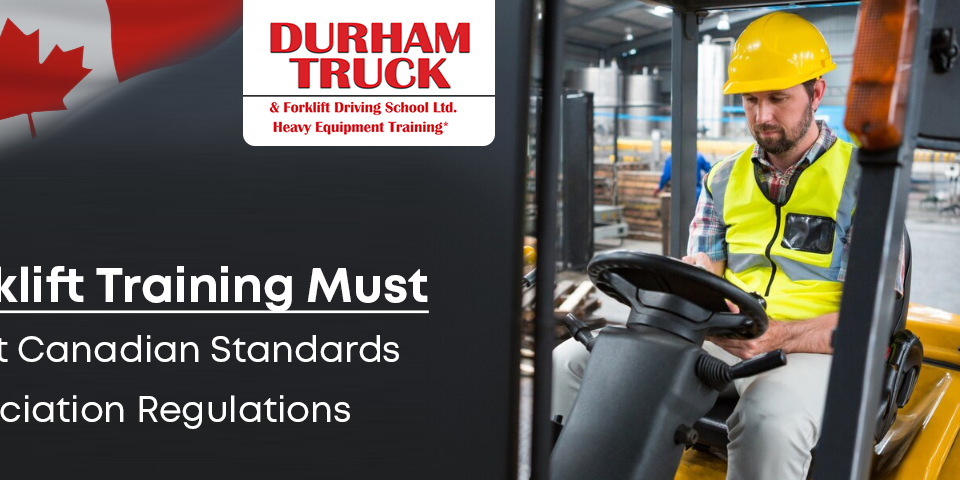Mastering the Art of Forklift Operation: Essential Tips for Construction Site Safety

Unveiling the Secrets of Professional Forklift Driver Training: A Comprehensive Guide
January 29, 2024
Mastering Proper Driving Techniques for Large Commercial Vehicles: A Comprehensive Guide
February 29, 2024Introduction:
Operating a forklift on a construction site requires skill, precision, and a solid commitment to safety. Forklifts are indispensable machines in the construction industry, facilitating the efficient movement of heavy materials. However, their power and capability also pose significant risks if not operated correctly. Forklift driver training is essential to ensure the safety of both the operator and those working around them. This blog post will explore crucial tips for operating a forklift on a construction site, emphasizing the importance of proper training and adherence to safety guidelines.
- Invest in Comprehensive Forklift Driver Training:
The foundation of safe forklift operation lies in comprehensive training. Forklift operators should undergo formal training programs that cover both theoretical and practical aspects of forklift operation. These programs typically include understanding the machine’s controls, load handling, stability principles, and safety protocols. A well-trained operator is better equipped to handle the challenges of construction site environments. If you are looking for Forklift training, contact Durham Truck and Forklift Training School Ltd. Give us a call at +1(905) 492-7500.
- Understand Forklift Controls:
Forklifts come in various models and designs, each with its unique set of controls. Operators must familiarize themselves with the specific controls of the forklift they will be operating. Understanding the functions of levers, pedals, and switches ensures smooth operation and minimizes the risk of accidents.
- Conduct Pre-Operational Checks:
Before each shift, operators should conduct thorough pre-operational checks on the forklift. This includes inspecting the tires, brakes, steering, lights, and other critical components. Any issues or abnormalities should be reported immediately for prompt maintenance. Regular maintenance ensures the forklift’s reliability and contributes to overall site safety.
- Load Handling and Weight Capacity:
Knowing the weight capacity of the forklift and understanding load handling principles are fundamental to safe operation. Never exceed the specified load capacity, and consistently distribute the load evenly. Operators should be trained to assess the weight of the load, consider its dimensions, and determine the appropriate lifting points. Incorrect load handling is a common cause of accidents on construction sites.
- Maintain Stability:
Forklift stability is critical to preventing tip-overs and accidents. Operators should know the forklift’s center of gravity and avoid making sharp turns or sudden movements, especially when carrying heavy loads. The mast should be tilted slightly back when elevating a load to maintain stability. Understanding the forklift’s stability triangle is essential for safe operation.
- Follow Speed Limits and Traffic Rules:
Construction sites often have designated speed limits and traffic rules to prevent collisions and ensure a smooth workflow. Forklift operators should adhere to these regulations and adjust their speed according to the working conditions. Slow down in congested areas, at intersections, and when approaching blind spots to minimize the risk of accidents.
- Use Safety Attachments:
Depending on the task, forklifts may require specific attachments such as clamps, side shifters, or forks with extensions. Properly attaching and securing these accessories is crucial for safe operation. Operators should be trained in correctly using attachments and follow manufacturer guidelines to prevent accidents and damage to the forklift.
- Maintain Clear Visibility:
A clear line of sight is essential for safe forklift operation. Operators should keep the windows and mirrors clean, adjust the seats and mirrors for optimal visibility, and use horns and lights to alert pedestrians and other workers. Eliminating blind spots reduces the risk of collisions and ensures a safer working environment.
- Implement a Communication System:
Establishing effective communication protocols on the construction site is crucial for preventing accidents. Forklift operators should communicate with other workers, especially when moving in reverse or handling large loads. Hand signals, radios, or other communication devices can facilitate clear and concise communication, enhancing overall site safety.
- Emergency Procedures and First Aid Training:
Forklift operators should be well-versed in emergency procedures and first aid protocols. A prompt and effective response can make a significant difference in an accident or injury. Training should cover handling emergencies, evacuating the forklift safely, and administering basic first aid until professional help arrives.
- Avoid Distractions:
Forklift operators must remain focused and alert at all times. Distractions such as using mobile phones, eating, or conversing while operating the forklift can lead to accidents. Encourage operators to concentrate solely on the task and avoid distractions that compromise their attention and reaction time.
- Regularly Update Training:
Construction sites evolve, and new safety guidelines, technologies, and regulations may emerge. Regularly updating forklift operator training ensures that operators stay informed about the latest safety standards and best practices. Continuous education enhances their skills and helps maintain a safety culture on the construction site.
Conclusion:
Operating a forklift on a construction site demands skill, responsibility, and a commitment to safety. Forklift driver training is the cornerstone of safe operation, equipping operators with the knowledge and skills necessary to navigate the challenges of construction environments. By understanding forklift controls, conducting pre-operational checks, and adhering to load-handling principles, operators contribute to a safer and more efficient construction site. Construction companies must prioritize ongoing training and foster a culture of safety to mitigate risks and ensure the well-being of everyone on the site. Following these essential tips can significantly enhance forklift operation safety and contribute to the overall success of construction projects.




